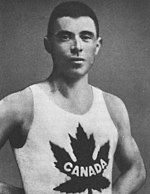Edouard Fabre
|
Edouard Fabre |
|
| nation |
|
| birthday | August 21, 1885 |
| place of birth | Sainte-Geneviève-de Batiscan, Canada |
| size | 170 cm |
| Weight | 67 kg |
| date of death | July 1, 1939 |
| Place of death | Montreal , Canada |
| Career | |
|---|---|
| discipline | Long distance running |
| Best performance | Marathon: 2:26:24 h |
Édouard "Ed" Fabre (born August 21, 1885 in Sainte-Geneviève-de-Batiscan ( Québec ), Canada ; † July 1, 1939 in Montreal (Québec), Canada) was a Canadian athlete who was one of the world's best long-distance runners and marathoners counted at the beginning of the 20th century . Fabre's greatest sporting successes were taking part in the 1912 Summer Olympics in Stockholm and winning the Boston Marathon in 1915. In Canada, Fabre is an athlete's legend to this day , because hardly any other Canadian athlete can boast more successes. His collection of winners' and honorary awards for races from 2 to 200 miles includes 164 trophies and 151 medals .
At the age of 8, Édouard Fabre came to an orphanage after losing his parents , from where he soon ran away. He came to Kahnawake in the local Mohawk - Indian Reservation where you took him and reared. Fabre quickly learned the common trait among the local Indians of effortlessly balancing at great heights on narrow beams and girders. Like many Indians, he found work building bridges and high-rise buildings.
Living on the Indian reservation favored Fabre's passion for running. In 1904 he took part in a running competition for the first time, which he immediately won. The assertion made in various publications that Fabre participated at his own expense in the 1906 Olympic Intermediate Games in Athens and the 1908 Summer Olympic Games in London is unproven. Fabre does not appear as a participant in any available source.
It was not until 1911 that Fabre first came into the public eye when he finished third behind the winner Clarence DeMar and another runner at the Boston Marathon . In the same year, Fabre achieved a significant success at the Round the Mountain Race over 10 miles in Montreal, which he was the first French-Canadian to win. From then on he was a respected runner in the country and was eligible to participate in the 1912 Summer Olympics in Stockholm . The marathon there was characterized by very high temperatures, which ultimately even cost one runner, Francisco Lázaro , his life. For Fabre the run was less dramatic but disappointing as he had to be content with 11th place.
In 1914, Fabre, now a member of the Richmond Athletic Club of Montreal , took part in the Boston Marathon for the fourth time in a row. The run turned into a thriller with Fabre's compatriot James Duffy . It was only on the last kilometer that Duffy ran out a small lead, which meant victory with a 15 second lead, which is one of the smallest gaps between a winner and runner-up to this day. Both opponents met again a few weeks later at a five-mile run organized by Duffy at a 800-meter racecourse in Kingston . This time Fabre won by almost 300 meters.
The fifth consecutive participation in the Boston Marathon finally brought Fabre victory in 1915. With temperatures approaching 30 ° C, he held back during the entire run and was only 7th with two miles to go and 800 meters behind the leader. While his competitors in front of him were slowing down, sometimes even having to walk, Fabre started an incredible final sprint and only took the lead shortly before the finish. The success earned Fabre an invitation to the Panama Exposition Marathon in August 1915 in San Francisco . With another victory over runners he had beaten months earlier in Boston, Fabre proved that he was undoubtedly one of the best marathoners of his time.
Fabre took part in the Boston Marathon several times between 1911 and 1928 and was able to place seven times among the top 10 runners. After that, he began a career as a professional runner and participated in the strangest competitions. So he won a race over 24 hours against a horse, which should prove that a person has greater endurance. In 1930, he won a 190-mile (304 km) snowshoeing competition from Québec to Montreal, a competition spread over 6 days, for which Fabre needed a total of 34:18:45 hours. He then traveled through the country with a film made about this competition.
In 1937, Fabre suffered a stroke that paralyzed his left side and made it impossible for him to do any sport. After a second stroke in 1939, Fabre died at the age of 53.
In 1964, Édouard Fabre was inducted into the Canada Sports Hall of Fame . A small park in Montreal was named Parc Édouard Fabre in memory of him .
Web links
- Canada Sports Hall of Fame
- Édouard Fabre in the Olympedia.org database (English)
| personal data | |
|---|---|
| SURNAME | Fabre, Édouard |
| ALTERNATIVE NAMES | Fabre, Ed (nickname) |
| BRIEF DESCRIPTION | Canadian athlete |
| DATE OF BIRTH | August 21, 1885 |
| PLACE OF BIRTH | Sainte-Geneviève-de-Batiscan , Canada |
| DATE OF DEATH | July 1, 1939 |
| Place of death | Montreal , Canada |
